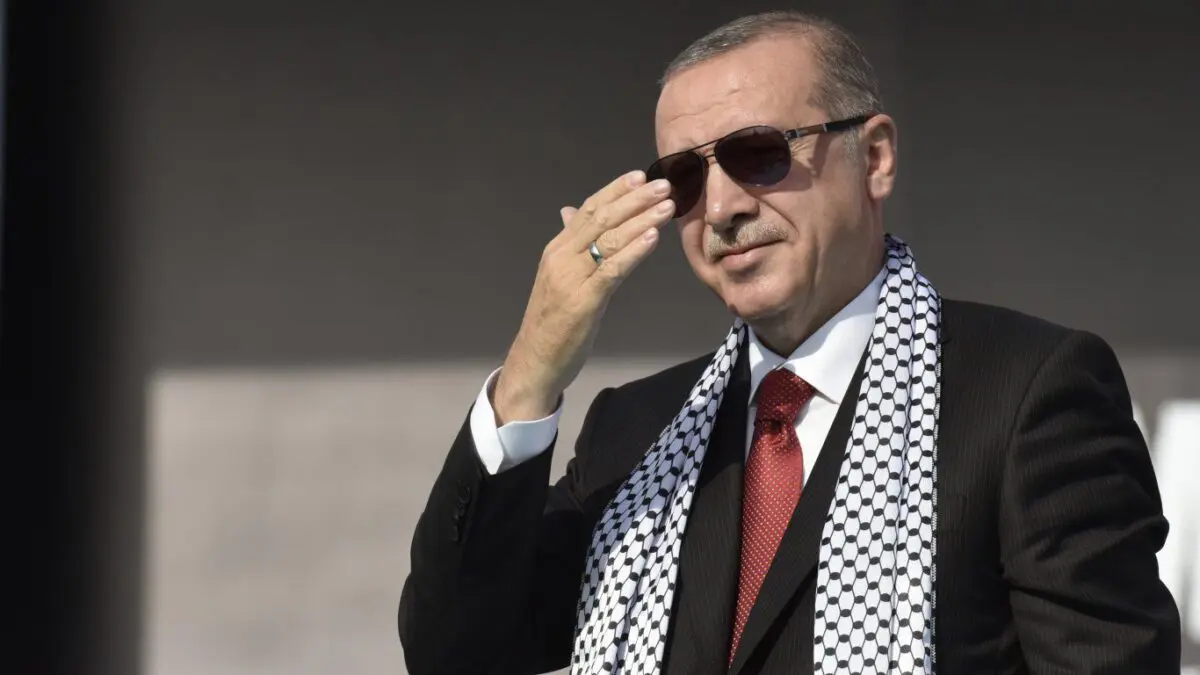In 2010, he patented the first letters of his name as his own trademark
Turkish President Recep Tayyip Erdogan undoubtedly has a distinctive style, and not just in government. His plaid jackets have established his own style in fashion and a few years ago were the subject of lively discussions among designers and stylists not only in Turkey. It is no coincidence that in 2010 he patented as his own brand the first letters of his name – RTE.
His inimitable style in the game of table tennis has recently become a topic of discussion on social media, after he was recently filmed playing first with students and then with the President of Kazakhstan Kasam-Jomart Tokayev.
The unusual way in which the Turkish leader holds the stick – from the wide part instead of the handle – does not correspond to the grip of either the European or Asian ping-pong school. This provoked comments on social networks and even malicious remarks from political opponents.
“As he holds the stick, so he runs the country,” opposition Good Party MP Aytun Charai wrote on Twitter. Many on the Internet described the move as “local and national” – a tease of Turkey’s efforts in recent years to replace imports with “local and national” products in the defense industry and other sectors of the economy.
But let’s put tennis aside. Turkey’s foreign policy course under President Erdogan also has a specific handwriting – zigzagging. In recent years, the country has found itself virtually isolated after severing ties with most regional powers in the Middle East and significantly straining ties with the West.
Now, however, Ankara has taken a sharp turn in the opposite direction and has set out to melt the ice on all fronts. The country’s skillful maneuvering in the conflict in Ukraine has scored points for the EU and the United States. Separately, in recent months, it has begun to open a new page in its relations with countries such as Israel, Saudi Arabia, Egypt, the United Arab Emirates, and recently even talked about possible reconciliation with Damascus.
Turkey, once known as “Israel’s closest ally in the Muslim world,” has seriously deteriorated its relations with the Jewish state in recent years, despite strong trade ties. The two countries have maintained diplomatic relations at the embassies at the level of the Chargé d’Affaires since 2018 after another crisis that has deepened tensions – the US decision to move its embassy to Israel from Tel Aviv to Jerusalem.
After months of escalating tensions in May 2018, Turkey returned its ambassador from Israel and expelled the Israeli ambassador from Ankara. Recently, however, the two countries have taken steps towards reconciliation – the Israeli president visited Turkey in early March, and later this month, on May 25, Turkish Foreign Minister Mevlut Cavusoglu will visit Israel.
Pragmatism has taken precedence over ideology and relations with Egypt. Ankara has suspended diplomatic relations since the 2013 military coup against President Mohammed Morsi and refused to recognize Abdel Fattah al-Sisi as the leader of the Arab country. The ambassadors of the two countries were subsequently recalled for consultations, and a similar move by Ankara followed after declaring the Turkish ambassador in Cairo persona non grata.
Last year, however, Erdogan announced the start of contacts between Ankara and Cairo, and recently justified the change in foreign policy, stressing that Turkey would gain nothing by completely severing ties with Egypt and Israel.
“(Turkey’s) relations with Egypt need to improve. Both countries are very important for the region, the normalization of relations is very important for the Eastern Mediterranean,” the Turkish foreign minister said in an interview with NTV recently. ambassadors.
Similar processes are under way with regard to relations with Saudi Arabia and the UAE. Ankara and Riyadh have demonstrated a common will to develop bilateral relations at the highest level. These intentions were boosted by the transfer to Saudi Arabia of the Turkish trial in the case of the assassination of Saudi journalist Jamal Hashoghi at the Kingdom’s consulate in Istanbul in 2018 – a case that cooled relations between the two regional powers and shook with its brutality worldwide. Heartfelt photos from the Turkish president’s visit to Riyadh last month were a clear signal that this “misunderstanding” remains a thing of the past for both sides.
“I believe that my visit will mark the beginning of a new era in relations between the two countries. We have shown a common will to strengthen ties based on mutual respect and trust, most openly and at the highest level,” the Turkish leader said after the visit. its the end of April.
Turkey also puts differences with the UAE in the background: in February, Erdogan visited the emirates for the first time in nearly a decade, turning his back on power struggles, disagreements over the Libyan conflict, the blockade of Qatar and even doubts about the UAE’s role in Turkey’s coup. . Earlier in November, UAE Crown Prince Sheikh Mohammed bin Zayed Al Nahyan visited Turkey, a visit that Erdogan said marked a “new era” in bilateral relations (as well as investments in Turkey of 10 billion).
Erdogan described another turn in Turkish foreign policy as “a process of making friends, not enemies”, adding that Turkey needs to improve relations with countries with which it shares “common beliefs and opinions”. We will find out how far this process will go, but one thing seems certain – the Turkish leader will continue to rule the country with his own style and style, at least until next year’s elections …







